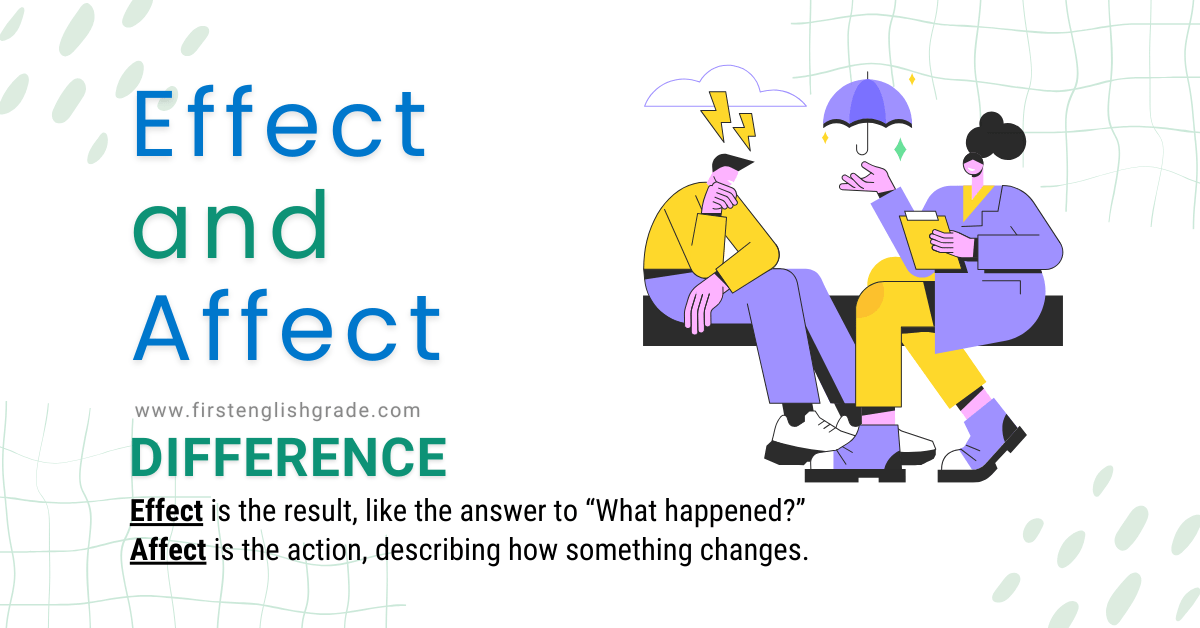Effect vs. affect – two words that often leave people confused. They sound similar, but their meanings and usage in sentences can be quite different. In this article, we will explore the difference between effect and affect, providing you with a clear understanding of when to use which word. By the end of this article, you will be able to use effect and affect confidently and correctly in your writing and speaking.
Effect vs. Affect: Understanding Effect and Affect
Effect as a Noun
Effect is a noun and refers to the result or consequence of an action or situation. When you talk about the “effect,” you are describing what happened as a result of something else. It is like the answer to the question, “What happened next?” For example: Lack of sleep can have a negative effect on your health. (Not sleeping well causes health problems.)
Affect as a Verb
Affect, on the other hand, is a verb and refers to the process of having an impact on or influencing something or someone. When you use “affect,” you are talking about how one thing makes something else happen or change. It is like the action that creates the result. For example: How you present yourself can affect how others perceive you. (Your behavior influences how people see you.)
A simple way to remember the difference between effect and affect:
- Effect is the result, like the answer to “What happened?”
- Affect is the action, describing how something changes or influences something else.
Effect vs. Affect Examples
The difference between Effect and Affect becomes clearer when you see them in action. Let’s explore some examples to grasp their differences:
Effect Examples
- The rainy weather had a calming effect on her mood.
- The effect of the medication was almost immediate.
- The director used lighting and music to create a powerful effect in the film.
- The movie had a profound effect on her emotions, leaving her in tears.
Affect Examples
- Loud noises can affect a person’s ability to concentrate.
- The weather affected the outcome of the game.
- The economic downturn will likely affect job opportunities in the area.
- His encouraging words affected her decision to pursue her dreams.
Effect vs. Affect: Common Mistakes to Avoid
One common mistake is using “effect” as a verb when it should be “affect.” This often happens when people are trying to express the idea of causing something to happen. For example:
- Incorrect: The new policy will effect positive change.
- Correct: The new policy will affect positive change.
Another mistake is using “affect” as a noun when it should be “effect.” This often happens when people are trying to express the idea of a result or consequence. For example:
- Incorrect: The affect of the new policy was overwhelmingly positive.
- Correct: The effect of the new policy was overwhelmingly positive.
Tips for Remembering the Difference
Here are some tips to help you remember the difference between effect and affect:
- Think of the word “result” when you see “effect.” This will help you remember that effect is a noun.
- Think of the word “influence” when you see “affect.” This will help you remember that affect is a verb.
- Use mnemonic devices, such as “A is for Action” (affect) and “E is for End Result” (effect).
- The RAVEN Acronym: RAVEN stands for Remember Affect Verb, Effect Noun. This acronym helps to differentiate their roles. “Affect” usually functions as a verb, showing action (Remember: Affect is a Verb). Conversely, “effect” generally acts as a noun, denoting a thing or result (Remember: Effect is a Noun).
Common Phrases Using Effect and Affect
10 Common Phrases Using Effect
- Take effect: The new policy will take effect next month.
- In effect: The law is already in effect, so be aware of the changes.
- Have an effect on: Smoking can have a negative effect on your health.
- The butterfly effect: A small action can have far-reaching consequences, known as the butterfly effect.
- Cause and effect: Understanding the cause and effect helps analyze situations.
- Side effect: Some medications may have side effects.
- Special effects: The movie’s special effects were impressive.
- In full effect: The party is in full effect, and everyone is having a great time.
- Positive effect: Regular exercise can have a positive effect on your overall well-being.
- The domino effect: One event can trigger a series of events, known as the domino effect.
10 Common Phrases Using Affect
- Affect the outcome: Your efforts can positively affect the outcome of the project.
- Emotionally affected: The news about the accident deeply affected him.
- Affect one’s mood: Lack of sleep can affect your mood and productivity.
- Affect change: Working together can affect positive change in the community.
- Weather can affect travel plans: Stormy weather may affect your travel arrangements.
- Affect a solution: Finding common ground is essential to affect a solution.
- Affect one’s decision: The persuasive argument might affect her decision.
- Affect someone deeply: The heartfelt letter affected her deeply.
- Affect the way: Your attitude can affect the way people perceive you.
- Affect the market: Economic changes can affect market trends.
Synonyms for Effect and Affect
Synonyms for Effect (Noun)
- consequence
- result
- outcome
- aftermath
- conclusion
Synonyms for Affect (Verb)
- influence
- impact
- alter
- change
- modify
- inspire
Conclusion
Effect vs. affect – two small words that can make a big difference in your writing. By understanding the difference between these two words and avoiding common mistakes, you can improve the clarity and accuracy of your writing. With the tips provided in this article, you can use effect and affect correctly and confidently.
Effect vs. Affect FAQs
What is the difference between Effect and Affect?
Effect is most commonly used as a noun meaning “a result or consequence,” while affect is most commonly used as a verb meaning “to act on or produce a change in someone or something.”
When to use effect or affect in a sentence?
Use “effect” when referring to a result or outcome. For example: The new law had a significant effect on traffic safety. Use “affect” when describing the action of producing a change or influencing something. For example: The economic downturn can affect job opportunities.
How to remember the difference between effect and affect?
One helpful mnemonic is to remember that “Affect” is an Action (both start with ‘A’). So, if you’re talking about an action or influence, use “affect.” On the other hand, “Effect” is a result (both end with ‘t’), so if you’re discussing the result or outcome of something, use “effect.”




